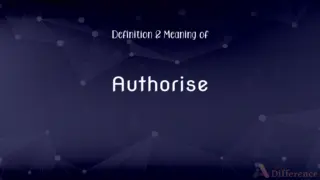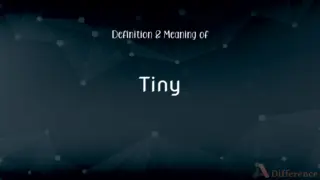Elicit Definition and Meaning
By Tayyaba Rehman & Urooj Arif — Published on March 30, 2024
Elicit means to draw out or evoke a response, answer, or fact from someone in reaction to one's own actions or questions. e.g., The teacher's question elicited a variety of responses from the students.
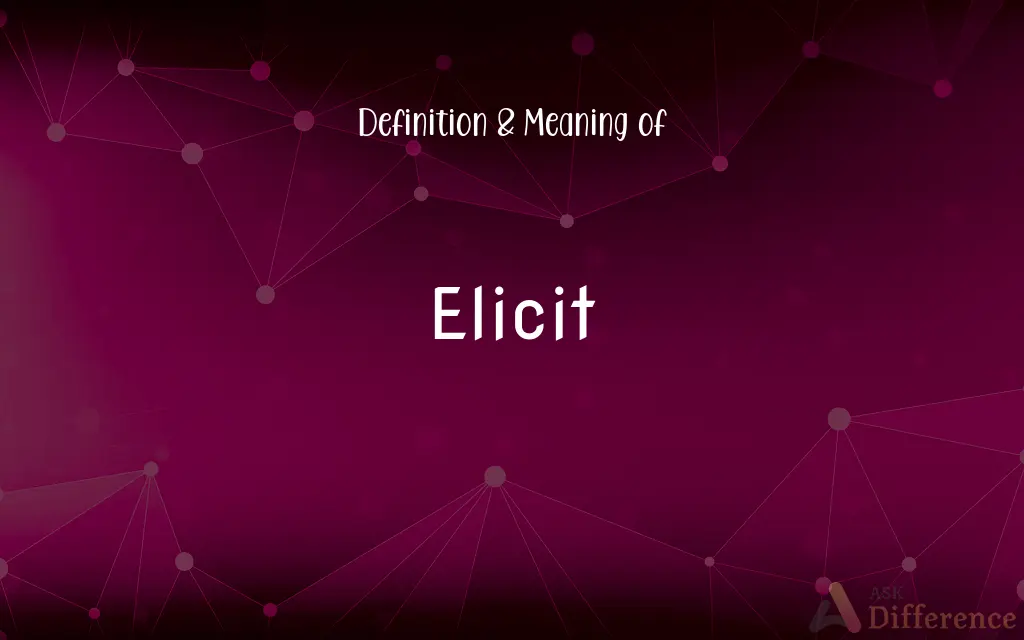
Table of Contents
Elicit Definitions
To provoke or trigger a reaction in a subtle or indirect way.
The documentary aimed to elicit empathy for the endangered species.
To bring out or draw forth emotions, reactions, or responses.
The comedian's jokes elicited laughter from the audience.
To obtain something, especially information or a reaction, through effort.
She elicited the support of her colleagues for the project.
To evoke or draw out (a response, answer, or fact) from someone.
The therapist was able to elicit her client's deepest fears.
To deduce or infer information from evidence or context.
From her tone, he elicited that she was upset.
To stimulate or arouse a reaction or response.
The scent of the flowers elicited memories of spring.
To cause something to be revealed or made manifest.
The experiment was designed to elicit a specific chemical reaction.
To extract information or a response through questioning or discussion.
The investigator was able to elicit crucial details from the witness.
To generate or produce a response or answer.
The survey elicited interesting data on consumer habits.
To bring to light something hidden or undisclosed.
The discussion elicited facts previously unknown to the group.
To call forth, draw out, or provoke (a response or reaction, for example)
"Interrogators were reportedly frustrated by their inability to elicit useful information from him" (Jane Mayer).
To evoke, educe (emotions, feelings, responses, etc.); to generate, obtain, or provoke as a response or answer.
To draw out, bring out, bring forth (something latent); to obtain information from someone or something.
Fred wished to elicit the time of the meeting from Jane.
Did you elicit a response?
To use logic to arrive at truth; to derive by reason
(obsolete) Elicited; drawn out; made real; open; evident.
Elicited; drawn out; made real; open; evident.
To draw out or entice forth; to bring to light; to bring out against the will; to deduce by reason or argument; as, to elicit truth by discussion.
Call forth (emotions, feelings, and responses);
Arouse pity
Raise a smile
Evoke sympathy
Deduce (a principle) or construe (a meaning);
We drew out some interesting linguistic data from the native informant
Derive by reason;
Elicit a solution
Elicit Snonyms
Provoke
To stimulate or give rise to (a reaction or emotion, typically a strong or unwelcome one) in someone.
The movie's ending may provoke controversy.
Engender
To cause to exist or to develop; produce.
The policy changes engendered confusion among the employees.
Evoke
To call up or produce (memories, feelings, etc.).
That song evokes memories of my childhood.
Induce
To lead or move by persuasion or influence, as to some action or state of mind.
The therapist tried to induce a sense of calm in her patient.
Invoke
To call on (a higher power) for assistance, support, or inspiration.
She invoked her audience's sense of justice.
Generate
To bring into existence; cause to be; produce.
The new policy generated a lot of discussion.
Derive
To receive or obtain from a source or origin.
She derived great satisfaction from helping others.
Summon
To call forth (emotions, feelings, or responses); to evoke.
The speech summoned a sense of unity among the listeners.
Extract
To get, pull, or draw out, usually with special effort, skill, or force.
The lawyer managed to extract the truth from the reluctant witness.
Prompt
To cause or bring about (an action, feeling, or thought).
The alarm prompted a quick exit from the building.
Elicit Idioms & Phrases
Elicit information
To draw out details or facts from someone.
The detective's questioning technique was designed to elicit information efficiently.
Elicit a response
To provoke a reaction or answer.
The speaker's provocative statement was sure to elicit a response from the crowd.
Elicit sympathy
To evoke feelings of sympathy from others.
The plight of the stranded tourists elicited sympathy from the locals.
Elicit excitement
To generate enthusiasm or eagerness.
The announcement of the guest speakers elicited excitement among the attendees.
Elicit support
To obtain backing or assistance through appeal or persuasion.
The charity event elicited support from numerous celebrities.
Elicit feedback
To seek and obtain opinions or evaluations from others.
The pilot program was launched to elicit feedback from the community.
Elicit a smile
To bring about a smile through one's actions or words.
His kind gesture elicited a smile from the stranger.
Elicit a reaction
To provoke or trigger a response, whether emotional, intellectual, or physical.
The artist's controversial work was intended to elicit a reaction.
Elicit interest
To arouse curiosity or attention.
The mysterious teaser for the new movie elicited interest worldwide.
Elicit participation
To encourage involvement or engagement from a group.
The interactive exhibit was designed to elicit participation from visitors.
Elicit laughter
To provoke laughter or amusement.
The comedian's timing was perfect, easily eliciting laughter from the audience.
Elicit controversy
To provoke dispute or disagreement.
The proposed legislation was bound to elicit controversy.
Elicit an apology
To draw out an expression of regret or remorse.
The misunderstanding eventually elicited an apology from both parties.
Elicit admiration
To provoke admiration or respect.
Her dedication and hard work elicited admiration from her peers.
Elicit a pledge
To obtain a solemn promise or undertaking.
The fundraiser event elicited pledges totaling over a million dollars.
Elicit a confession
To obtain an admission of guilt or wrongdoing.
After hours of interrogation, the detective was able to elicit a confession.
Elicit concern
To provoke worry or anxiety.
The rising pollution levels elicited concern from environmentalists.
Elicit approval
To gain acceptance or agreement.
The new design concept quickly elicited approval from the board.
Elicit a decision
To bring about a resolution or determination.
The extensive debate finally elicited a decision from the committee.
Elicit a promise
To obtain a commitment or pledge from someone.
She managed to elicit a promise from her friend to keep the secret.
Elicit Example Sentences
Her paintings elicit strong emotions, ranging from joy to sadness.
The teacher's creative lesson plans often elicit enthusiastic participation from the students.
A well-crafted survey can elicit valuable insights from respondents.
His speech aimed to elicit a sense of urgency about climate change.
The novel's intricate plot twists elicit surprise and suspense among its readers.
The vibrant colors of the sunset elicit awe and appreciation from onlookers.
The counselor's gentle questioning helped to elicit the child's fears and concerns.
Common Curiosities
How many syllables are in "elicit"?
"Elicit" has three syllables.
What is a stressed syllable in "elicit"?
The stressed syllable in "elicit" is the second one, "lic."
How is "elicit" used in a sentence?
"Elicit" is used to describe the action of drawing out a response or information, e.g., The questionnaire was designed to elicit honest feedback.
What is the verb form of "elicit"?
"Elicit" itself is the verb form.
What is the first form of "elicit"?
The first form of "elicit" is "elicit," as it is the base form of the verb.
Why is it called "elicit"?
The term "elicit" comes from the Latin word "elicitus," meaning "drawn out," reflecting its meaning of drawing out responses or information.
What is the second form of "elicit"?
The second form of "elicit" is "elicited," which is the past tense and past participle form.
How do we divide "elicit" into syllables?
"Elicit" is divided as e-lic-it.
What is the singular form of "elicit"?
"Elicit" is already in its singular form as a verb; it doesn't have a singular or plural form like nouns do.
What is the pronunciation of "elicit"?
"Elicit" is pronounced as /ɪˈlɪsɪt/.
What is the root word of "elicit"?
The root word of "elicit" is the Latin word "elicere," meaning "to draw out."
Is "elicit" an abstract noun?
"Elicit" is not a noun; it is a verb, so it cannot be an abstract noun.
Is "elicit" a countable noun?
"Elicit" is not a noun; it is a verb.
What is another term for "elicit"?
Another term for "elicit" is "provoke."
Is "elicit" a noun or adjective?
"Elicit" is a verb, not a noun or adjective.
Is "elicit" a negative or positive word?
"Elicit" is neutral; it can be used in both positive and negative contexts depending on what is being elicited.
Is the word “elicit” a Direct object or an Indirect object?
"Elicit" is a verb and therefore does not function as a direct or indirect object, but it can take direct objects, e.g., "The questions elicited honest answers."
Which determiner is used with "elicit"?
As a verb, "elicit" is not typically associated with determiners, which are more commonly used with nouns.
What is the opposite of "elicit"?
The opposite of "elicit" could be "suppress" or "quell," meaning to prevent or reduce the expression of.
Is "elicit" an adverb?
No, "elicit" is not an adverb.
Which article is used with "elicit"?
As a verb, "elicit" does not typically require an article directly before it, but in noun phrases, "the" can be used, e.g., "the ability to elicit."
What is the third form of "elicit"?
The third form of "elicit" is the same as the second, "elicited."
Is "elicit" a vowel or consonant?
The word "elicit" starts with a vowel sound (/ɪ/).
Is "elicit" a collective noun?
No, "elicit" is not a noun, so it cannot be a collective noun.
Which vowel is used before "elicit"?
The vowel used before "elicit" can vary depending on the context, but an 'a' or 'an' might precede it, e.g., "an attempt to elicit."
What part of speech is "elicit"?
"Elicit" is a verb.
What is the plural form of "elicit"?
As a verb, "elicit" does not have a plural form.
Is the "elicit" term a metaphor?
"Elicit" can be used metaphorically in contexts where information or reactions are drawn out in a figurative sense.
Is the word "elicit" imperative?
"Elicit" can be used in imperative sentences to command someone to draw out information or a response, e.g., "Elicit the truth from him."
Is the word "elicit" a Gerund?
"Eliciting" can be a gerund when used as a noun, e.g., "Eliciting feedback is crucial for improvement."
Which preposition is used with "elicit"?
Common prepositions used with "elicit" include "from" and "with," e.g., "elicit information from someone" or "elicit a response with questions."
Which conjunction is used with "elicit"?
Conjunctions are not specifically tied to the use of "elicit"; various conjunctions can be used in sentences with "elicit" depending on the sentence structure.
Share Your Discovery
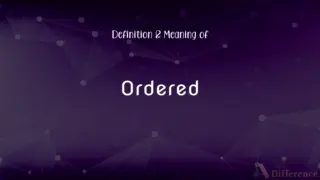
Previous Term
Ordered Definition and Meaning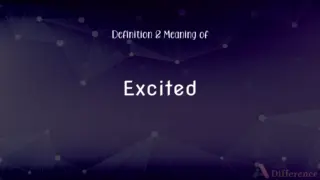
Next Term
Excited Definition and MeaningAuthor Spotlight
Written by
Tayyaba RehmanTayyaba Rehman is a distinguished writer, currently serving as a primary contributor to askdifference.com. As a researcher in semantics and etymology, Tayyaba's passion for the complexity of languages and their distinctions has found a perfect home on the platform. Tayyaba delves into the intricacies of language, distinguishing between commonly confused words and phrases, thereby providing clarity for readers worldwide.
Co-written by
Urooj ArifUrooj is a skilled content writer at Ask Difference, known for her exceptional ability to simplify complex topics into engaging and informative content. With a passion for research and a flair for clear, concise writing, she consistently delivers articles that resonate with our diverse audience.







